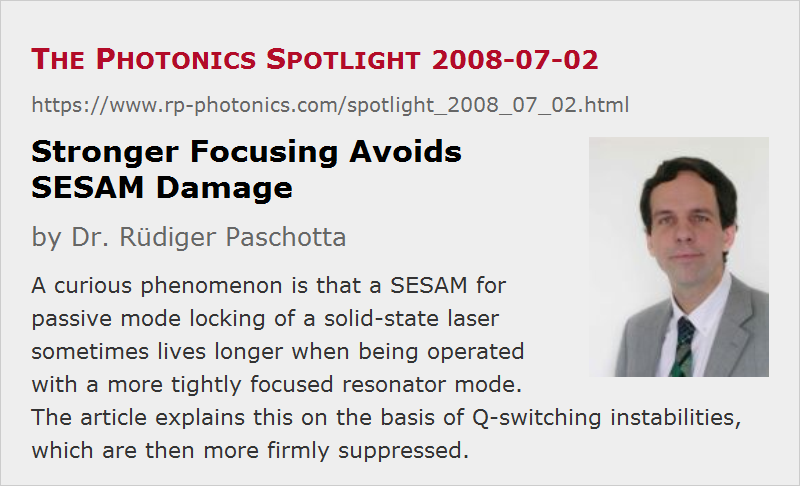Stronger Focusing Avoids SESAM Damage
Posted on 2008-07-02 as a part of the Photonics Spotlight (available as e-mail newsletter!)
Permanent link: https://www.rp-photonics.com/spotlight_2008_07_02.html
Author: Dr. Rüdiger Paschotta, RP Photonics Consulting GmbH
Abstract: A curious phenomenon is that a SESAM for passive mode locking of a solid-state laser sometimes lives longer when being operated with a more tightly focused resonator mode. The article explains this on the basis of Q-switching instabilities, which are then more firmly suppressed.

Ref.: encyclopedia articles on semiconductor saturable absorber mirrors, passive mode locking
The following curious situation can sometimes be observed when trying passive mode locking of a solid-state laser with a semiconductor saturable absorber mirror (SESAM): the SESAM works fine when operated with a relatively strongly focused laser beam, but is quickly destroyed when the resonator design is modified such that the mode area on the SESAM becomes larger. This is really against all intuition: weaker focusing should lead to lower optical intensities, and thus reduce rather than increase the risk of damage!
The reason behind this peculiarity is that for too weak focusing on the SESAM, the mode-locking process can exhibit Q-switching instabilities. Here, the pulse energy undergoes strong fluctuations, and some of the pulses are much more intense than the average. Therefore, the peak intensity on the SESAM becomes even higher, despite the larger mode area.
This article is a posting of the Photonics Spotlight, authored by Dr. Rüdiger Paschotta. You may link to this page and cite it, because its location is permanent. See also the RP Photonics Encyclopedia.
Note that you can also receive the articles in the form of a newsletter or with an RSS feed.
Questions and Comments from Users
Here you can submit questions and comments. As far as they get accepted by the author, they will appear above this paragraph together with the author’s answer. The author will decide on acceptance based on certain criteria. Essentially, the issue must be of sufficiently broad interest.
Please do not enter personal data here; we would otherwise delete it soon. (See also our privacy declaration.) If you wish to receive personal feedback or consultancy from the author, please contact him e.g. via e-mail.
By submitting the information, you give your consent to the potential publication of your inputs on our website according to our rules. (If you later retract your consent, we will delete those inputs.) As your inputs are first reviewed by the author, they may be published with some delay.
 |




If you like this page, please share the link with your friends and colleagues, e.g. via social media:
These sharing buttons are implemented in a privacy-friendly way!